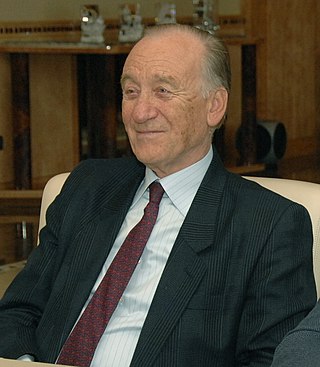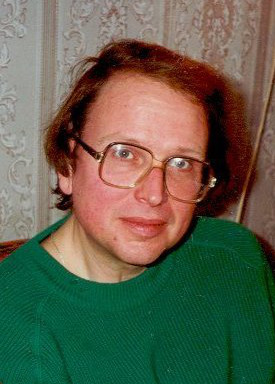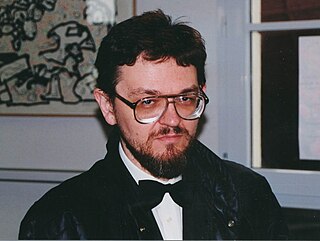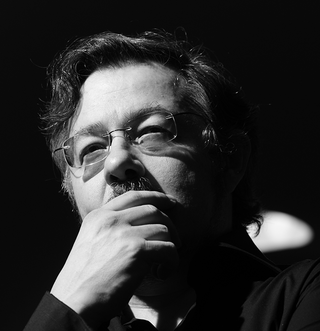
Rodion Konstantinovich Shchedrin is a Soviet and Russian composer and pianist, winner of USSR State Prize (1972), the Lenin Prize (1984), and the State Prize of the Russian Federation (1992), and is a former member of the Inter-regional Deputies Group (1989–1991). He is also a citizen of Lithuania and Spain.

Vissarion Yakovlevich Shebalin was a Soviet composer, music pedagogue. Rector of the Moscow Conservatory (1942-1948). People's Artist of the RSFSR (1947).

Lev Nikolayevich Oborin was a Soviet and Russian pianist, composer and pedagogue. He was the winner of the first International Chopin Piano Competition in 1927.
The Kopelman Quartet is a Russian string quartet founded in 2002 by Mikhail Kopelman (violin), Boris Kuschnir (violin), Igor Sulyga (viola) and Mikhail Milman (cello). They studied at the Moscow Conservatory in the 1970s, but pursued individual careers for twenty-five years before founding the quartet.
Levon Ambartsumian is an Armenian classical violinist and conductor. Levon Ambartsumian currently lives and works in Athens, Georgia, United States.

Yuri Sergeyevich Kasparov is a Russian composer, music teacher and a professor at the Moscow Conservatory where he had studied for his doctorate under Edison Denisov. Under the patronage of Denisov, he founded the Moscow Contemporary Music Ensemble in 1990 and is its artistic director. He is the chairman of the Russian section of the International Society for Contemporary Music.
Leonid Vladimirovich Nikolayev was a Russian and Soviet pianist, composer and pedagogue. People's Artist of the RSFSR (1938).

Alexander Ivashkin, was a Russian cellist, writer, academic and conductor. He was a professor of music and the Chair of Performance Studies at Goldsmiths, University of London since 1999, the director of the Centre for Russian Music, and the curator of the Alfred Schnittke Archive. In 1996, he published the first English-language biography of the composer Alfred Schnittke.

Olesya Rostovskaya is a Russian composer, theremin player, carillonneur, organist, and zvonist.

Michael Lazarevich "Misha" Geller was a Russian viola player and composer.
Igor Zubkovsky is a Russian cellist.

Mikhail Georgiyevich Kollontay, Russian composer and pianist. Also known under his mother's name, Ermolaev.
Vera Georgievna Dulova was a Russian harpist and instructor. The Russian school or method is named after her.
Igor Gavrish is a Russian cellist and Professor of Cello at the Moscow Conservatory. He was the winner of the 1968 Pablo Casals Cello Competition at the Budapest International Competition, and of the International Tchaikovsky competition (1970).
Valery Vorona is a Russian violinist, soloist, conductor, and Meritorious Artist. Vorona graduated from the Gnessin State Musical College and was a post-graduate student at the Moscow Conservatory where he later became a professor. Later on he became a conductor and teacher in positions which added to his career. Currently he is both artistic director and conductor-in-chief of the Moscow Chamber Orchestra for young violinists as well as a soloist of the Moscow Philharmonic Orchestra and a President of the Russian Performing Art Foundation. He also serves as a rector at the Ippolitov-Ivanov Mupic Pedagogical Institute and by 2008 became both conductor and soloist of the Saint Petersburg International Economic Forum. He has participated at various festivals such as the Russian Festival in San Francisco as well as Vladimir Spivakov Festival and Sakharov Festival in Nizhny Novgorod. Besides national performances he has also performed overseas in such countries as France, Greece, Israel, Italy, Spain, the United States and various former Soviet republics. He has appeared with many well-known conductors including Ukrainian Oleh Krysa and Oleksandr Bondurianskyi and the Russian conductors Valentin Berlinsky, Vladimir Ponkin, Vladimir Repin, Yuri Bashmet, and Maxim Vengerov.

Vasily Shcherbakov is a Russian pianist, professor and composer.
Hrachya Melikyan was an Armenian music composer and film composer. Hrachya Melikyan synthesized world music developments and national music particularities, forging his own characteristic and distinctive musical style. The majority of his compositions are instrumentals, including symphonic, chamber, as well as ensemble compositions. Melikyan also composed numerous choir compositions, romances, pieces for different instruments, as well as music to films including The Ingenious Peasant. He was a member of the Union of Composers and Musicologists from 1972 and the Vice President of the Union of Composers and Musicologists of Armenia from 1991 until his untimely death in March 2006.
Rinat Ibragimov was a virtuoso Russian-Tatar classical double bassist, best known as the principal bass of the London Symphony Orchestra and for his solo performances and recordings.

Vladimir Mikhailovich Genin is a Russian-German composer, pianist and piano teacher. He has lived in Munich since 1997.
The Shostakovich Quartet was a string quartet formed in September 1966 at the Moscow Conservatory, and which continued to perform for some 47 years until the start of 2014. It is named after Dmitri Shostakovich.










